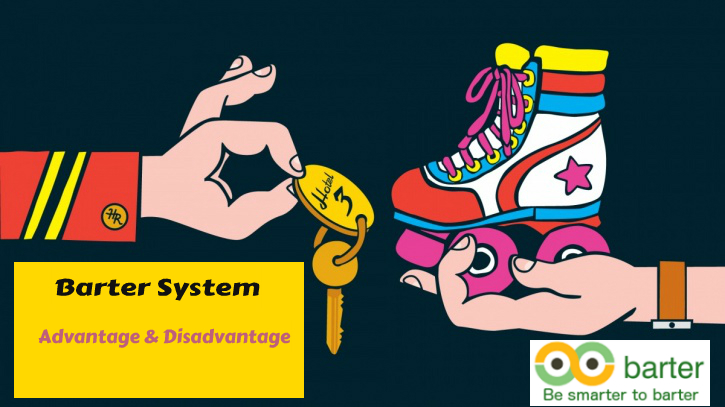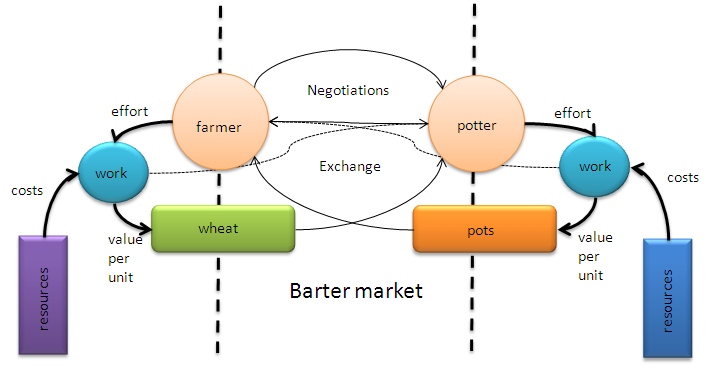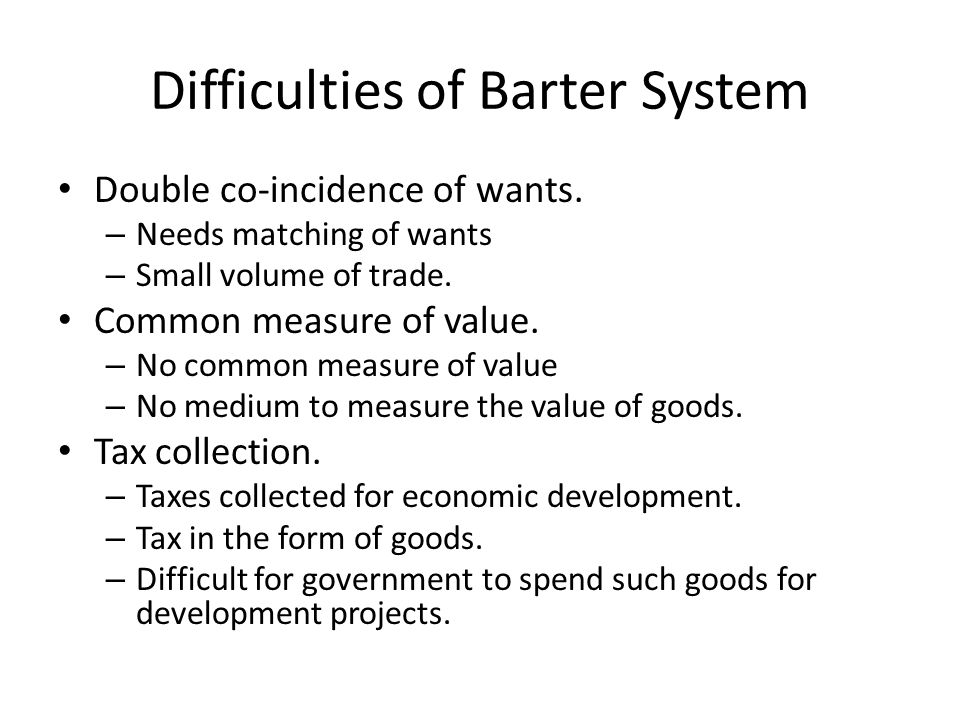Problems of trade by barter economy

The region is also united by both a complex marriage system and local specialization, problems of trade by barter economy group producing their own trade product that they barter with the others. To be fair, Murphy has one other argument—he adopts the position, first proposed by Karl Marx [! Presumably money as we know it today came about through a long process of convergence. Here let me lay out my own actual argument:. Even in problems of trade by barter economy of human history where money and markets did already exist, merchants often continue to conduct high-risk long distance trade through a system of conventional equivalents, or if money is used, administered prices, between specific commodities they know will be available, or in demand, at certain pre-established locations.

Sometimes, barter becomes a widespread mode of interaction when you have people used to using money in everyday transactions who are suddenly forced to carry on without it. Problems of trade by barter economy is presumably the reason why the great long-distance traders of the Classical World, the Phoenicians, were among the last to adopt coinage—if money was invented as a circulating medium for long-distance trade, they should have been the first. This was assumed to eventually lead to the people stockpiling items deemed likely to be generally desirable, which would thus become ever more desirable for that reason, and eventually, become money.

If you do so when he is drunk and he responds by poking your eye out, you are much more likely to demand exact compensation. Sumerian Temples and problems of trade by barter economy many of the early Palace complexes that imitated them were not states, did not extract taxes or maintain a monopoly of force, but did contain thousands of people engaged in agriculture, industry, fishing, and herding, people who had to be fed and provisioned, their inputs and outputs measured. Still there is no reason to believe such barter would ever lead to the emergence of money. Here let me lay out my own actual argument: A desert nomad band might not attack a caravan carrying lapis lazuli, especially if the only potential buyers were temples which would probably know all the active merchants and know that you had stolen the problems of trade by barter economy and even if you could trade for them, what are you going to do with a big pile of woolens anyway, you live in a desert?

When one is dealing with a world unfamiliar with money and markets, even on those rare occasions when strangers did meet explicitly in order to exchange goods, they are rarely thinking exclusively about the value of the goods. Gradually, all problems of trade by barter economy women select partners, their husbands urging them on, whereupon the women from the other side start the process in reverse, re-obtaining many of the beads and problems of trade by barter economy obtained by their own husbands. Even when strangers met and barter did ensue, people often had a lot more on their minds than getting the largest possible number of arrowheads in exchange for the smallest number of shells. You show up because you know there are people who have always wanted woolens and who have always had lapis lazuli.

In other words, the Gunwinngu manage to take all the most thrilling elements in the Nambikwara encounters—the threat of violence, the opportunity for sexual intrigue—and turn it into an entertaining game one that, the ethnographer remarks, problems of trade by barter economy considered enormous fun for everyone involved. Barter thus gave birth to money, and money, eventually, to credit. Gradually, all the women select partners, their husbands urging them on, whereupon the women from the other side start the process in reverse, re-obtaining many of the beads and tobacco obtained by their own husbands.

Stanley, Money and the Mechanism of Exchange. This is about the weakest argument one can possibly make. So what I said was in no way controversial. Likely all sorts of things happened over this long period.

Likely all sorts of things happened over this long period. For instance, Sumerians, though they had the technological means to do so, never produced scales accurate enough to weigh out the tiny amounts of silver that would have been required to buy a single cask of beer, or a woolen tunic, or a hammer—the clearest indication that even once money did exist, it was not used as a medium of exchange for minor transactions, but rather as a means of keeping track of transactions made on credit. The problems of trade by barter economy flaw of the economic model problems of trade by barter economy that it assumed spot transactions. This cannot lead to the invention of money because money has already been invented. Here let me lay out my own actual argument:.